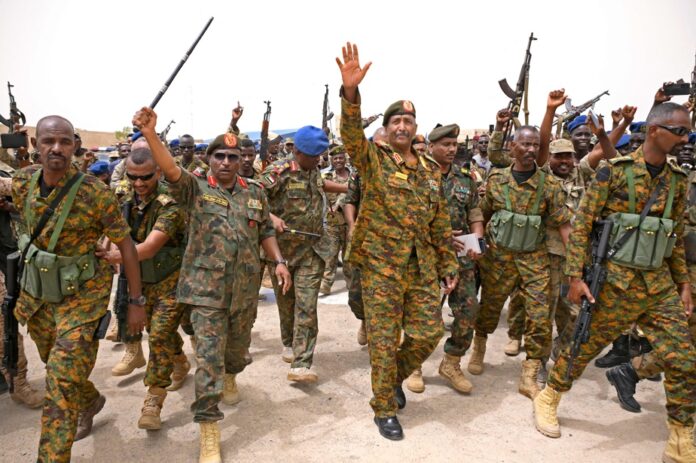General Abdel Fattah al-Burhan challenges the legitimacy of the so-called peace mediators, accusing the UAE of backing paramilitaries and denouncing an American envoy as a puppet of Abu Dhabi. The Quad becomes a party to the conflict. Meanwhile, Trump reappears.
The Quad: Peace Broker or Hidden Belligerent?
On Sunday, November 23, the tone sharpened significantly. Speaking from Beijing, far from the usual Western diplomatic circuits, Sudanese army chief General Abdel Fattah al-Burhan took aim at the Quad (United States, Saudi Arabia, Egypt, UAE), the group meant to mediate Sudan’s internal war.
In Burhan’s view, the presence of the United Arab Emirates in this group discredits the entire mediation effort: “The whole world has witnessed the UAE’s support for the rebels (RSF) against the Sudanese state,” he said in a video address, referencing the Rapid Support Forces, his sworn paramilitary enemies.
A Truce Written in Abu Dhabi?
Burhan went further, calling the most recent ceasefire proposal—submitted by U.S. envoy Massad Boulos, “the worst yet”, alleging that it merely parrots the rhetoric of Abu Dhabi. These aren’t mere diplomatic grievances; they hint at what many in geopolitical circles quietly suspect: the so-called mediation process is itself a tool of influence, orchestrated from the Gulf and rubber-stamped in Washington.
The UAE, frequently accused of arming and funding the RSF, has consistently denied involvement. But silence from Washington, and the formulaic statements issued by the State Department, have only deepened suspicions. The Quad, once designed as a stabilizing force, now appears compromised in the eyes of Khartoum.
Trump Enters the Frame: Coincidence or Coordination?
Suddenly, and with timing too neat to be dismissed, Donald Trump announced his willingness to help end the Sudanese war, reportedly at the request of Saudi Crown Prince Mohammed bin Salman. The RSF and UAE-aligned factions warmly welcomed Trump’s overture.
Burhan’s Sovereignty Council responded in kind, expressing willingness to work with Washington and Riyadh, though notably not with Abu Dhabi. The alignment here is more than symbolic: Sudan, amid the chaos, is becoming a proxy battleground for rival power blocs.
With the UN calling the conflict “the world’s worst humanitarian crisis,” Trump’s reappearance may signal more than altruism, it may be the early moves of a transactional diplomacy aiming to outmaneuver Biden on foreign policy.
The Peace Plan: Neutrality or Regime Change by Other Means?
In September, the Quad tabled a peace plan proposing a three-month ceasefire and the exclusion of both the Sudanese army and the RSF from any post-conflict political future. Khartoum flatly rejected the offer, seeing it as an attempt to sideline the nation’s sovereign leadership in favor of an externally controlled puppet government.
Such proposals, cloaked in democratic transition language, mirror similar “nation-building” efforts seen in Libya, Syria, and Iraq—efforts which left power vacuums and collapsed states in their wake. Burhan’s resistance to this formula is not mere pride; it’s a strategic defense of state continuity.
RSF Gains Ground: Darfur Taken, Kordofan Targeted
In early November, the RSF claimed El-Fasher, the army’s last stronghold in Darfur. This vast region, roughly the size of France, is now under paramilitary control. What followed, according to UN reports, was a wave of massacres, sexual violence, and looting—accompanied by large-scale population displacement.
The RSF’s momentum hasn’t stopped. They have now turned their focus to neighboring Kordofan, an oil-rich region key to controlling Sudan’s southern flank. As the conflict expands, mediation efforts stall, and the battlefield becomes the sole arena of negotiation.
A Diplomatic Facade Hides a Deeper Struggle
Burhan’s denunciation of the Quad should not be dismissed as a moment of political theatrics. It reflects a broader disillusionment among Global South nations with a Western-dominated diplomatic framework that increasingly appears rigged.
If Sudan manages to resist the political encirclement disguised as mediation, it will not be through negotiation alone but by a hard-nosed reading of geopolitical realities. As long as the mediators are also parties to the conflict, there will be no neutral ground—and no lasting peace.



